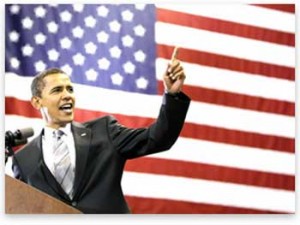by Gene Healy, CATO Institute
This article appeared in the DC Examiner on November 17, 2009.
 Friends of federalism cheered last month when the Obama administration reversed the Bush policy of prosecuting medical marijuana cases in states that have legalized the practice. Welcome though that change was, let’s hold the applause.
Friends of federalism cheered last month when the Obama administration reversed the Bush policy of prosecuting medical marijuana cases in states that have legalized the practice. Welcome though that change was, let’s hold the applause.
Not yet a year into his administration, Obama’s record on 10th Amendment issues is already clear: He’ll let the states have their way when their policies please blue team sensibilities and he’ll call in the feds when they don’t. Thus, he’ll grant California a waiver to allow it to raise auto emissions standards, but he’ll bring the hammer down when the state tries to cut payments to unionized health care workers.
That’s not how it’s supposed to work. As Madison explained in Federalist 45, the powers delegated to the federal government were “few and defined,” to be exercised mainly on “external objects” like foreign policy and international trade. All else — criminal law, marriage, social policy — remained with the states or the people.
Of course, No. 45 also contains one of the Federalist’s saddest sentences, in which Madison predicts that federal tax collectors will be “principally on the seacoast, and not very numerous.” (Sometimes the Framers weren’t all that prescient.)
Indeed, the federal government’s massive power to tax and spend has increasingly allowed it to trample state prerogatives. As the $786 billion stimulus package came online this year, for the first time ever, federal aid surpassed the sales tax as the largest source of revenue for the states.
“This money isn’t manna from heaven,” warned Indiana state Sen. Jim Buck, “it comes with a price.”
California learned that lesson back in May. Struggling to close a $40 billion budget gap, the state government lowered payments to home health care workers, but the Obama team threatened to withhold billions of dollars in stimulus money unless the wage subsidies were restored.
Officials in Gov. Arnold Schwarzenegger’s office accused the Service Employees International Union, a longtime Obama ally, of improper influence.
Just a few years back, the Republicans — nominally the party of federalism — were busily wielding federal power to enforce red state values — prosecuting medical marijuana patients, punishing doctors participating in Oregon’s “Death with Dignity” initiative, and trying to overturn Florida court decisions that allowed Terry Schiavo to be removed from life support. In that odd political climate, you often heard liberals lamenting the decline of states’ rights.
That strange new respect for the 10th Amendment lasted roughly as long as the blue team’s exile from power.
Education Secretary Arne Duncan said recently that “if we accomplish one thing in the coming years, it should be to eliminate the extreme variation in standards across America.” Diversity is bad, uniformity double-plus good; get with the program, comrade.
But one of federalism’s core virtues is the enormous diversity it allows. Decentralization makes it easier for Americans to escape unwelcome state experiments with fiscal and social policy.
It enhances the political power of individual citizens by allowing important decisions of governance to be settled closest to where Americans live and work. And it avoids making politics a centralized war of all against all, where each contested issue is settled in a one-size-fits-all fashion at the level furthest from the people.
Our federal system shouldn’t be a red team/blue team issue, respected or flouted depending on who’s up and who’s down. Conservatives are learning to rue their abandonment of federalist principles during the last administration; liberals may come to regret their rush toward centralization during the next.
Gene Healy is a vice president at the Cato Institute and the author of The Cult of the Presidency.
